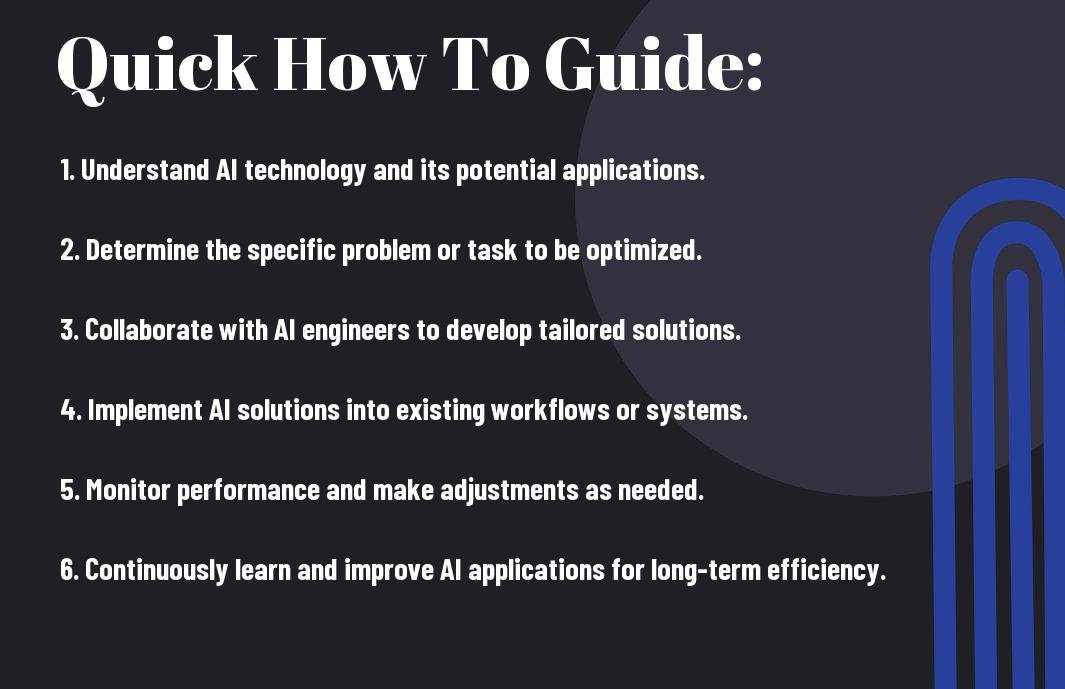This guide will investigate into the intricate world of artificial intelligence and how it can revolutionize workplaces. By studying the techniques utilized by Prompt Engineers, we will uncover the key strategies to boost productivity and efficiency using AI technology. From automating tedious tasks to predicting outcomes, AI has the power to transform the way businesses operate. Join us as we explore the insider secrets to harnessing the full potential of artificial intelligence in your organization.
Key Takeaways:
- Utilize Automation: Leveraging AI for automating routine tasks can significantly boost efficiency by eliminating manual labor and reducing human error.
- Continuous Learning: Implementing AI algorithms that can learn and adapt to new data and circumstances allows for ongoing optimization and increased productivity.
- Data-Driven Insights: By analyzing vast amounts of data, AI can provide valuable insights that can help businesses make informed decisions, streamline processes, and enhance overall efficiency.

Understanding the Basics of AI and Prompt Engineering
While understanding the basics of AI and prompt engineering is crucial for maximizing efficiency in artificial intelligence systems, it is imperative to investigate into the fundamental principles that govern these technologies. Here are some chatGPT prompt samples to help you explore this topic further:
- Explain the concept of artificial intelligence.
- What is the role of prompt engineering in AI development?
- How do AI models generate responses based on prompts?
- Describe the importance of data in training AI models.
- What are some common applications of AI in today's world?
How AI Works – A Quick Overview
Prompt: The Role of Machine Learning in AI.
Prompt: Explain the process of natural language understanding in AI.
Prompt: Describe the difference between supervised and unsupervised learning in AI.
Prompt: How do neural networks contribute to AI development?
Prompt: Discuss the concept of reinforcement learning in AI.
Prompt: The Role of a Prompt Engineer in AI Efficiency
Prompt: What are the responsibilities of a prompt engineer in AI development?
Prompt: Explain how prompt optimization can enhance AI performance.
Prompt: Describe the skills required to be a successful prompt engineer.
Prompt: How does a prompt engineer collaborate with data scientists and engineers?
Prompt: Discuss the impact of prompt engineering on the final output of AI models.
You may already have some understanding of what a prompt engineer does in artificial intelligence, but let’s investigate a bit deeper into their crucial role. These engineers are tasked with crafting prompts that effectively guide AI models to generate accurate and relevant responses. By fine-tuning these prompts, prompt engineers significantly influence the performance and efficiency of AI systems. Here are some chatGPT prompt samples to help you grasp the importance of prompt engineers in AI efficiency:
- How does a prompt engineer optimize prompts for AI models?
- Explain the relationship between prompt engineering and AI output quality.
- What are the key considerations for prompt engineers in crafting effective prompts?
- Describe the impact of prompt variations on AI model performance.
- Discuss the collaborative efforts between prompt engineers and AI developers.
With AI technologies revolutionizing various industries, understanding the basics of AI and prompt engineering is paramount for harnessing the full potential of these innovations. By grasping how AI works and the critical role prompt engineers play in enhancing AI efficiency, organizations can optimize their systems for maximum productivity and effectiveness. Through meticulous crafting of prompts and continuous optimization, prompt engineers can elevate AI performance to unprecedented levels, paving the way for groundbreaking advancements in artificial intelligence.
Tips for Maximizing AI Efficiency
To ensure optimal efficiency when leveraging artificial intelligence, it is important to follow certain guidelines and best practices. By incorporating these tips into your workflow, you can enhance the performance and effectiveness of AI systems. Below are some key considerations to keep in mind:
- Use Clear and Concise Prompts: Crafting precise and specific prompts can significantly impact the quality of AI-generated outputs.
- Experiment with Different Prompt Styles: Testing various prompt styles can help you identify the most effective approach for your specific use case.
- Regularly Evaluate and Refine Prompts: Continuously reviewing and adjusting prompts based on performance feedback is crucial for optimizing AI efficiency.
Knowing how to effectively utilize prompts is fundamental to maximizing AI efficiency in any application.
Factors to Consider for Efficient AI Operations
Clearly defining your objectives, understanding the capabilities of your AI model, and selecting appropriate prompts are key factors to consider for efficient AI operations. By identifying the specific goals you aim to achieve and tailoring your prompts accordingly, you can streamline your AI workflows for maximum efficiency.
- Define Clear Objectives: Establishing clear objectives and desired outcomes is important for guiding AI operations towards successful results.
- Understand Model Capabilities: Familiarize yourself with the strengths and limitations of your AI model to leverage its full potential effectively.
- Choose Relevant Prompts: Selecting prompts that align with your goals and target tasks is crucial for optimizing AI performance.
Assume that a thorough understanding of these factors will significantly enhance the efficiency of your AI operations.
How-to Guide: Streamlining AI Workflows with Prompt Engineering
Efficiently streamlining AI workflows is a critical aspect of maximizing productivity and achieving optimal results. By employing prompt engineering techniques, you can enhance the performance of AI models and streamline the execution of tasks. Below are some key steps to guide you through the process:
- Develop Custom Prompts: Creating tailored prompts that provide clear instructions and context for the AI model can improve output quality.
- Iterate and Test Prompts: Continuously iterating and testing different prompts can help refine the model’s understanding and enhance its performance.
- Optimize Prompt Structure: Experimenting with prompt structures and formats can help identify the most effective approach for specific tasks.
Efficient prompt engineering is a powerful tool for optimizing AI workflows and achieving desired outcomes effectively.
Understanding the nuances of prompt engineering and implementing best practices is important for maximizing AI efficiency. By following these tips and guidelines, you can enhance the performance of your AI systems and unlock their full potential. Remember to keep refining your approach and adapting to new challenges to stay ahead in the rapidly evolving landscape of artificial intelligence.
Advanced Techniques for Experienced Engineers
Despite having a strong foundation in artificial intelligence and its applications, experienced engineers can always push the boundaries further by adopting advanced techniques. Here are some chatGPT prompt samples related to this section:
- Explore cutting-edge machine learning models for advanced AI applications.
- Develop complex neural networks for specific tasks.
- Fine-tune hyperparameters for optimal model performance.
- Implement reinforcement learning algorithms for adaptive systems.- Leveraging Machine Learning Algorithms for Enhanced Performance
Despite the complexity of machine learning algorithms, experienced engineers can leverage them to enhance performance significantly. Through advanced techniques like ensemble learning, transfer learning, and meta-learning, engineers can optimize models for specific tasks effectively.
- Train machine translation models with transfer learning techniques.
- Implement ensemble learning for improved accuracy in predictive modeling.
- Utilize meta-learning algorithms to adapt quickly to new tasks.
- Fine-tune deep learning models for domain-specific applications.- Incorporating Predictive Analytics into Efficiency Strategies
Advanced engineers understand the power of predictive analytics in optimizing efficiency strategies. By analyzing historical data, identifying patterns, and developing predictive models, engineers can anticipate future trends and make informed decisions in real-time.
- Use predictive analytics to forecast equipment failures and schedule maintenance proactively.
- Implement predictive models for demand forecasting to optimize inventory levels.
- Utilize predictive analytics for dynamic pricing strategies based on market trends.
- Employ predictive maintenance algorithms to maximize asset performance.Strategies: Incorporating predictive analytics into efficiency strategies can revolutionize how engineers approach problem-solving and decision-making processes. By utilizing historical data and advanced algorithms, engineers can predict future outcomes with a high degree of accuracy and take proactive measures to optimize efficiency in various domains.

Maintaining Efficiency Over Time
Not only is achieving efficiency with artificial intelligence important, but it’s equally crucial to maintain this efficiency over time. As systems evolve and data sets change, it’s necessary to adapt and optimize your AI models continuously for peak performance. To assist with this, here are some chatGPT prompt samples related to maintaining efficiency over time:
- How can I ensure my AI system remains efficient as my business grows?
- What are the best practices for long-term AI model maintenance?
- Strategies for optimizing AI algorithms over time.
Routine Checks and Balances for Sustained AI Performance
One key aspect of maintaining efficiency in AI systems is implementing routine checks and balances to ensure sustained performance. Regular monitoring, updating, and fine-tuning of algorithms are vital to prevent degradation over time. Here are some chatGPT prompt samples related to routine checks and balances for sustained AI performance:
- How often should I conduct performance audits on my AI models?
- Tips for ensuring consistent quality in AI outputs.
- What are the signs that indicate it's time for a system update?
Tips for Ongoing Education and Skill Development in Prompt Engineering
Performance in prompt engineering hinges on continued education and skill development. Staying abreast of the latest advancements in AI technology, attending workshops, and participating in online courses are necessary for prompt engineers to refine their craft continually. Here are some chatGPT prompt samples related to ongoing education and skill development in prompt engineering:
- How can I enhance my skills in prompt engineering?
- Best resources for staying updated on AI trends and techniques.
- What are the key areas of focus for improvement in prompt engineering?
- Continuous learning: Engage in workshops and courses to stay updated on AI advancements.
- Experimentation: Try out new prompt techniques to expand your skill set.
- Community involvement: Join AI forums and groups to collaborate and learn from peers.
Performance in prompt engineering is heavily reliant on ongoing education and skill development. By continuously honing your abilities, you can adapt to the changing landscape of AI technologies and stay ahead of the curve. Recognizing the importance of lifelong learning is key to maintaining peak efficiency in this field.
Summing up
Efficiency in AI models is crucial for businesses aiming to leverage this technology successfully. The lessons learned from Prompt Engineers provide insights into maximizing efficiency when developing AI models. By understanding the principles of prompt engineering, organizations can enhance their AI capabilities and improve performance. To examine deeper into this topic, check out AI Prompt Engineering 101: Maximizing the Potential of AI …
FAQ
Q: What is the key to maximizing efficiency with Artificial Intelligence?
A: The key to maximizing efficiency with Artificial Intelligence is to constantly optimize algorithms, data models, and processes to meet evolving business needs and objectives. This requires a deep understanding of the technology and regular monitoring and adjustments to ensure peak performance.
Q: How can prompt engineers leverage Artificial Intelligence to enhance efficiency?
A: Prompt engineers can leverage Artificial Intelligence by developing customized algorithms and models that automate tasks, analyze data, and provide insights. By integrating AI tools into workflow processes, prompt engineers can streamline operations and make more informed decisions in real-time.
Q: What are some best practices for integrating Artificial Intelligence into prompt engineering processes?
A: Some best practices for integrating Artificial Intelligence into prompt engineering processes include defining clear objectives, gathering high-quality data, selecting the right AI technologies, conducting thorough testing and validation, and fostering a culture of continuous learning and improvement. By following these practices, prompt engineers can unlock the full potential of AI to drive efficiency and innovation.







